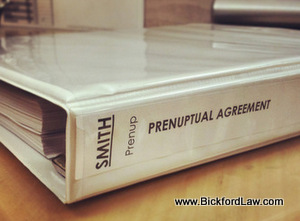Separate Property
 Characterization of property is an issue divorce attorneys are faced with in the majority of San Diego divorce cases. At the end of a case, the parties’ property must be divided by the Court or per agreement of the parties. Generally, there are only two ways property can be characterized: as community property or separate property. Separate property is all property acquired by either party before marriage and after separation. All property acquired from the date of marriage to the date of separation is community property. Property acquired during marriage will usually only be characterized as separate property if it was obtained by a spouse through gift, bequest or devise. The characterization of property is an important issue in each divorce because it will determine whether the spouses are entitled to half of an asset, none of an asset, or an asset in its entirety.
Characterization of property is an issue divorce attorneys are faced with in the majority of San Diego divorce cases. At the end of a case, the parties’ property must be divided by the Court or per agreement of the parties. Generally, there are only two ways property can be characterized: as community property or separate property. Separate property is all property acquired by either party before marriage and after separation. All property acquired from the date of marriage to the date of separation is community property. Property acquired during marriage will usually only be characterized as separate property if it was obtained by a spouse through gift, bequest or devise. The characterization of property is an important issue in each divorce because it will determine whether the spouses are entitled to half of an asset, none of an asset, or an asset in its entirety.
Read more about property division and divorce
If a particular asset is confirmed to a spouse as his or her separate property, he or she will be entitled take that asset upon divorce. On the other hand, if that same asset were characterized as community property, both spouses will be entitled to one-half of its value. It is important to note that the rules stated above are simply the default provisions codified in the California Family Code. In every divorce case, the parties have the ability to alter their property rights by agreement. There are three time periods in which spouses may agree to alter their property rights: before marriage, during marriage, and after separation. Divorce attorneys will advise their clients that the time frame when a spouse attempts to contract out of the default provisions will determine which rules the court applies to assess the validity of the agreement.
Before marriage, spouses may enter into a premarital agreement (commonly referred to as a prenup or PMA) which outlines any agreements they have reached regarding the distribution of property and/or spousal support in the event of divorce. In order to be enforceable, premarital agreements must meet strict guidelines set out in the family code. If spouses have already married but desire certainty in the event of divorce, they have the ability to enter into a postnuptial agreement. Postnuptial agreements afford the parties the same opportunity to avoid default property laws as premarital agreements.
Read more about premarital agreements and divorce
 After separation, divorce lawyers in a family law case may help the parties enter into a marital settlement agreement (commonly abbreviated as MSA). Every divorce will conclude either by trial where a family law judge will adjudicate all of the disputed issues, or by agreement of the parties. At trial, the judge must apply the default family law provisions to the parties’ case. However, if the parties reach an agreement outside of court, they have the ability to divide their assets in any way they see fit. Marital settlement agreements give divorce litigants the flexibility to create their own solutions which are mutually beneficial to both parties.
After separation, divorce lawyers in a family law case may help the parties enter into a marital settlement agreement (commonly abbreviated as MSA). Every divorce will conclude either by trial where a family law judge will adjudicate all of the disputed issues, or by agreement of the parties. At trial, the judge must apply the default family law provisions to the parties’ case. However, if the parties reach an agreement outside of court, they have the ability to divide their assets in any way they see fit. Marital settlement agreements give divorce litigants the flexibility to create their own solutions which are mutually beneficial to both parties.
In order to ensure all agreements between spouses, future spouses, and former spouses are enforceable, it is important to consult with an experienced family law attorney.
Contact Bickford Blado & Botros if you have a complex property situation and are considering divorce. Nancy J. Bickford is the only attorney in San Diego County representing clients in divorce who is a Certified Family Law Specialist (CFLS) and who is actively licensed as a Certified Public Accountant (CPA). Don't settle for less when determining your rights. Call 858-793-8884 for more information about the consultation process.
 San Diego Divorce Lawyers Bickford Blado & Botros Home
San Diego Divorce Lawyers Bickford Blado & Botros Home



